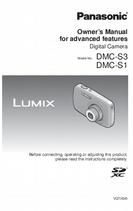
80 VQT3E45 VQT3E45 81
Usage cautions and notes
When in use
●
Camera may become warm if used for long periods of time, but this is not a fault.
●
Keep the camera as far away as possible from electromagnetic equipment (such
as microwave ovens, TVs, video games etc.).
• If you use the camera on top of or near a TV, the pictures and sound on the camera
may be disrupted by electromagnetic wave radiation.
• Do not use the camera near cell phones because doing so may result in noise
adversely affecting the pictures and sound.
• Recorded data may be damaged, or pictures may be distorted, by strong magnetic
fields created by speakers or large motors.
• Electromagnetic wave radiation generated by microprocessors may adversely affect
the camera, disturbing the pictures and sound.
•
If the camera is adversely affected by electromagnetic equipment and stops functioning
properly, turn the camera off and remove the battery or disconnect the AC adaptor
(optional). Then reinsert the battery or reconnect the AC adaptor and turn the camera on.
Do not use the camera near radio transmitters or high-voltage lines.
• If you record near radio transmitters or high-voltage lines, the recorded pictures and
sound may be adversely affected.
●
Do not keep objects that may be influenced magnetically close to the speaker.
• Magnetized objects such as bank cards, commuter passes, watches, may be
adversely affected by the magnetic influence of the speaker.
●
Do not extend the supplied cord or cable.
●
Do not allow camera to come into contact with pesticides or volatile substances (can
cause surface damage or coating to peel).
●
Never leave the camera and the battery in a car or on a car hood in the summer.
It may cause leakage of the battery electrolyte, generation of heat, and may cause a
fire and the battery to burst due to the high temperature.
Caring for your camera
To clean your camera, remove the battery or disconnect the power plug from the outlet,
and wipe with a soft, dry cloth.
●
Use a damp cloth to remove stubborn stains, before wiping again with a dry cloth.
●
Do not use benzene, thinners, alcohol, or kitchen detergent, as these may damage the
outer casing and finish of the camera.
●
If using a chemically-treated cloth, read the supplied instructions carefully.
When not using for a while
●
Turn off camera power before removing battery and card (ensure that battery is
removed to prevent damage through over-discharge).
●
Do not leave in contact with rubber or plastic bags.
●
Store together with a drying agent (silica gel) if leaving in a drawer, etc. Store batteries
in cool (15 °C - 25 °C (59 °F - 77 °F)) places with low humidity (40 %RH - 60 %RH) and
no major temperature changes.
●
Charge battery once per year and use completely before storing again.
Memory cards
●
To prevent damage to cards and data
• Avoid high temperatures, direct sunlight, electromagnetic waves, and static electricity.
• Do not bend, drop, or expose to strong impacts.
• Do not touch connectors on reverse of card or allow them to become dirty or wet.
●
When disposing of/transferring memory cards
• If using the “format” or “delete” functions on your camera or computer, this only
changes the file management information, and does not completely delete the data
from within the memory card. When disposing of or transferring your memory cards,
we recommend physically destroying the memory card itself, or using commercially
available computer data erasing software to completely delete the data from the card.
Data within memory cards should be managed responsibly.
LCD Monitor
●
Do not press hard on the LCD monitor. This may cause uneven display and damage
the monitor.
●
Do not press on the monitor with sharp, hard instruments such as ballpoint pens.
●
Do not rub the LCD monitor forcefully or push on it.
●
In cold climates or other situations when the camera becomes cold, the LCD monitor
may be slightly less responsive than normal immediately after startup. Normal
brightness will return once the internal components have warmed up.
Personal Information
If you set [Age] in [Baby] Mode, keep in mind that the camera and recorded pictures will
contain personal information.
●
Disclaimer
• Data containing personal information can be altered or lost due to malfunction, static
electricity, accidents, breakdowns, repairs, or other operations.
Panasonic will not be liable for any damage that occurs, direct or indirect, as a result
of the alteration or loss of data containing personal information.
●
When ordering repairs or transferring/disposing of the camera
• To protect your personal information, please reset the settings. (→29)
• If any pictures are contained in the built-in memory, copy (→62) them to a memory card
if necessary, and then format (→30) the built-in memory.
• Remove the memory card from the camera.
• When ordering repairs, the built-in memory and other settings may be returned to the
initial purchase state.
• If the above operations cannot be performed because of a camera malfunction,
consult with the dealer or nearest Service Center.
When transferring or disposing of your memory card, see “When disposing of/
transferring memory cards” in the previous section.
































